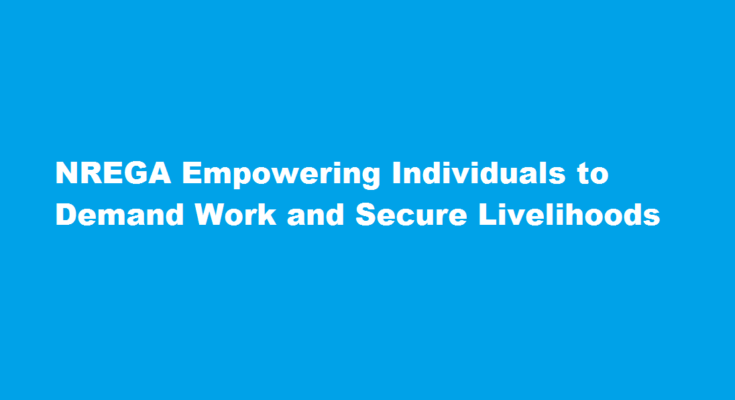Introduction
The Mahatma Gandhi National Rural Employment Guarantee Act (NREGA) in India is a landmark legislation that aims to alleviate poverty and provide livelihood security to rural households. This transformative scheme guarantees 100 days of wage employment per year to eligible beneficiaries. However, many individuals remain unaware of their rights or struggle to demand work effectively. This article sheds light on the steps and strategies individuals can employ to demand work under NREGA, ensuring they receive their entitled employment opportunities.
Understanding NREGA
Before diving into the process of demanding work under NREGA, it is crucial to understand the basic provisions of the scheme. NREGA provides job cards to rural households, certifying their eligibility for the program. These cards serve as a tool for demanding work, and individuals must possess them to access employment opportunities. The act mandates that work should be provided within 15 days of a job card holder making a formal request for employment. With this foundation in mind, let us explore how to demand work effectively under NREGA.
Obtain a Job Card
The first step towards demanding work under NREGA is to obtain a job card. Eligible individuals should approach their local Gram Panchayat or village council office and submit an application along with the necessary documents, including proof of residence and identity. The job card, once issued, becomes a crucial document that empowers individuals to demand work under NREGA. It is essential to ensure that all eligible members of the household are registered on the card, as it guarantees employment opportunities for the entire family.
Awareness and Information
To demand work effectively, individuals must stay informed about the provisions, entitlements, and processes under NREGA. Regularly checking official websites, attending community meetings, and engaging with local officials can provide valuable information about ongoing projects, the availability of work, and the rights of job card holders. Additionally, joining local self-help groups or community-based organizations can enhance awareness and strengthen collective bargaining power.
Filing a Formal Request
Once armed with a job card and adequate information, individuals should submit a formal request for work to their local Gram Panchayat office. The request should be accompanied by the job card number and other relevant details. It is crucial to keep a copy of the request acknowledgment as proof of submission. According to the Act, work should be provided within 15 days of the formal request. If the work is not provided within this timeframe, individuals have the right to compensation as per the provisions of the Act.
Grievance Redressal Mechanisms
NREGA has established grievance redressal mechanisms to address complaints and concerns regarding work allocation, wage payments, and other issues. Individuals should be aware of these mechanisms and avail themselves of them whenever necessary. Local officials, such as the Block Development Officer or the District Program Coordinator, can guide individuals in filing complaints and seeking resolutions. In cases where local authorities are unresponsive, individuals can escalate their grievances to higher authorities or engage with social activists and NGOs specializing in labor rights.
FREQUENTLY ASKED QUESTIONS
What is the process of getting a job card?
- Visit your gram panchayat office.
- You can register for a NREGA job card by asking for it or by filling a prescribed form and submitting it at the gram panchayat office.
- After verification of your details, a NREGA job card will be issued to you.
How many working days are required for MGNREGA?
“The mandate of the MGNREGA is to provide at least 100 days of guaranteed wage employment in a financial year to every rural household whose adult members volunteer to do unskilled manual work,” reads the Act’s mission statement.
Conclusion
NREGA serves as a powerful tool to uplift rural communities by providing employment and securing livelihoods. To effectively demand work under this scheme, individuals must acquire a job card, stay informed, and actively engage with local authorities. By following the outlined steps and utilizing grievance redressal mechanisms, individuals can ensure timely work allocation and wage payments. NREGA holds tremendous potential to empower individuals and foster inclusive development in rural India. It is essential for beneficiaries to be aware of their rights, demand work proactively, and actively participate in shaping their own futures.
Read Also : Demystifying The Dematerialization of Physical Shares



